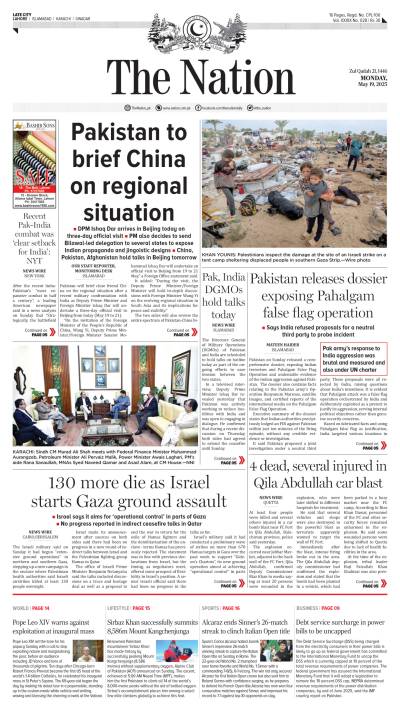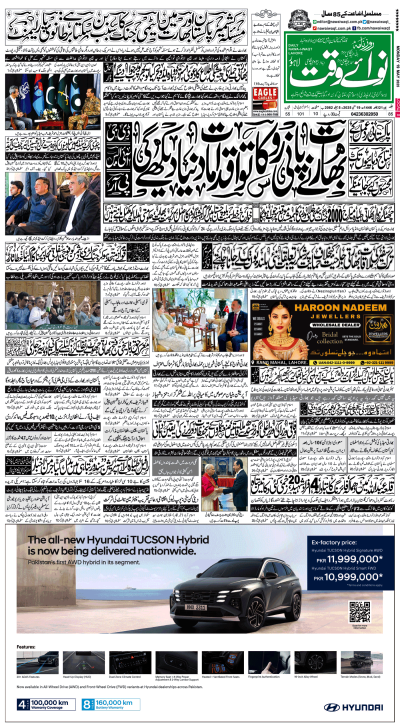LAHORE - Women participation in the politics is less as compared to men. The issue with women candidates on reserved seats is that in various cases, the party members bring their relatives to fill the seats.
“Women should be elected through public election because those who are chosen by the party have not done any work,” said Justice (retd) Nasira Javed Iqbal.
“The law makers do not agree to make constitutional changes in order to allow more participation of women. There is no law against nepotism which encourages politicians to favour their relatives,” she said.
Nasira quoted Jinnah’s 1947 speech about nepotism, bribery and corruption being the ultimate dangers for a nation. “It is high time we made an effort to bring real representative democracy for women,” she said.
Allocation of reserved seats
The allocation of reserved seats for women is on the basis of proportional representation on the total general seats won by any political party.
After the general election, the Election Commission produces an official gazette containing the number of seats won by each political party.
After that, the reserved seats are allocated to women on the basis of priority list submitted by the political parties.
But there is criticism against these lists that they have the names of women candidates who are somehow related to leading male members of the party.
Advocate Rushna Lodhi said that the number of reserved seats is sufficient, but they should be converted into direct representation so that real women representation should come into the political system.
“The common practice of bringing relatives on reserved seats should end,” she said.
Advocate Lubna Mehmood was in favour of increasing the number of reserved seats so that it would help in women empowerment. Dr Zarqa Taimur sharing her concerns said that favoritism exists even in political workers so it is necessary to consider merit-based opportunities rather than favoritism.
“There should be women seats for technocrats reserve seats category. Well-educated and qualified women should be selected,” she said. Tabita Victor, a lecturer at Kinnaird College and a political scientist, expressed her views saying “Women political representation is there but there is ‘no real say’ and ‘free will’ in the real terms.
Political parties revolve around family politics. Women are asked to take part in politics just to enhance the political power of male members of family,” she was of the view.
“Nepotism is not at all justified and increasing the number of reserved seats for women will not bring any significant change” said Uzma Aleem, a lecturer at Lahore College for Women University.
She quoted the prevalence of misogynistic and patriarchal approach of almost every political party. She targeted the absence of female participation in religious political parties.
Ms. Lodhi had the same opinion and said “We can easily find glaring manipulation on the part of notable male members to bring even their housewives in the assemblies on reserved seats.
This element subjugates, discriminates and frustrates the real political workers struggling for the party”.
But she was careful not to generalize the practice of women representing family name in politics. There are examples of politically strong women who are otherwise.
In consonance with Ms. Tabita Victor, political parties use their female relatives to fill the reserved seats in assemblies and avoid general elections. In many cases they want to secure their political position on behalf of them.
Funds
The problem is more technical with female candidates, especially on reserved seats. It is the policy of political parties to fund the election campaigns of their own candidates.
But the issue occurs when female candidates are given less or no funds for their campaigns. A lot of female candidates have shown their discontent towards their parties for not releasing the funds for campaigns.
“Female candidates cannot afford such a huge amount for campaign. So male political members take full benefit of campaign,” Lubna Mehmood.
Uzma showed her resentment towards the political parties for not funding and supporting the women candidates.
“Women on political positions should come from diverse backgrounds not only from privileged class so that concerns of every class come forward as a direct voice.
Women representing at political level should come if they have their own practical contribution in field,” Dr Zarqa said.





